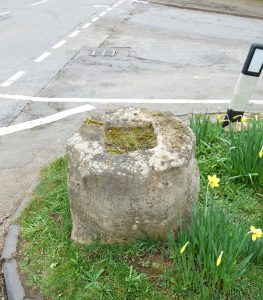There are two socket-stones on a small traffic island on Ermine Street in the centre of Appleby. The eastern stone is referred to as Appleby I and the western as Appleby II.

| Parish/District | Appleby/North Lincs |
| Location | Appleby I & II: On a traffic island at the junction of Ermine Street (B1207) and Risby Road. |
| Category | (I) & (II) Market Cross (?) |
| National Grid Ref | (I) SE 9492 1489 (II) SE 9491 1489 |
| Designation | (I) Listed II (II) Listed II |
| Stone Type | Limestone |
| Refs | Andrew, W., 1836, History of Winterton, p.40; Davies, D. S., 1915, Lincs N & Q Vol XIII No.5 pp129-157 |
| Visits | DS/HH: 12 March 2012 |
Appleby I
The setting today looks rather dismal and is dangerous for cross-spotters, but it was not always so. The site of the cross bases has probably survived because, until its felling in 1978, they shared it with a large elm tree known as Stocks Tree. The juxtaposition of market crosses with the village stocks is common – Appleby’s stocks had already disappeared by 1915 when Revd Davies reported: “Mr. Andrew in his History of Winterton, p.40., mentions that “from the records of the Tower, Appleby appears at one time to have had a market weekly on Thursday [sic]. It is now discontinued, but the Market Cross still remains in the Village. … The shaft has disappeared, as well as the stocks which stood near to it” (Davies 1915, p.131)
Davies records only one cross base in Appleby and from the measurements he gives it is likely to be Appleby I. The market charter granted to Geoffrey de Nevell in 1267 was for a market on Wednesdays, to be held at the manor. It is probable that this cross was a market cross associated with Appleby market – old maps show a widening of Ermine Street in this vicinity (Lyons 1991 p.198) and one might speculate that the market place had a cross at each end (c.f. Linby, Notts). However, this cross is unlikely to be in situ, and has almost certainly been moved to enable twentieth century traffic flow.
The socket stone is a two tier octagonal drum pedestal on a square base. The square is stopped to form the lower octagon and the upper octagon is turned by half a face (i.e. by 22.5o) … the overall effect looks robust and pleasing. The socket is square and empty.

Appleby II
The second of Appleby’s cross bases is a square block with the corners stopped to form an octagon. Most of the square part of the base is buried, with just the corner stops showing. The socket is octagonal and holds a fragment of shaft, cut flush with the top of the socket-stone, clearly outlined with its fixing lead.
Davies does not report this cross base in 1915, and it seems likely that it has been brought here since that date to join its partner. Pevsner comments: ‘On the w side of Ermine Street are the bases of two medieval crosses, perhaps wayside crosses, but thought to have come from Thornholme Priory‘ (Pevsner and Harris 1990, p.103). This seems a plausible tale but is unlikely. More interesting is a remark by Dudley: ‘The base of the old market cross stands at the crossroads near the north end of the village. A large stone in the grounds of the hall is claimed to have formed part of it‘.(Dudley 1931, p.185). Perhaps this second cross was originally located in the grounds of Appleby Hall, or maybe as noted in Appleby I above, it served as one of a pair of market crosses at Appleby.

